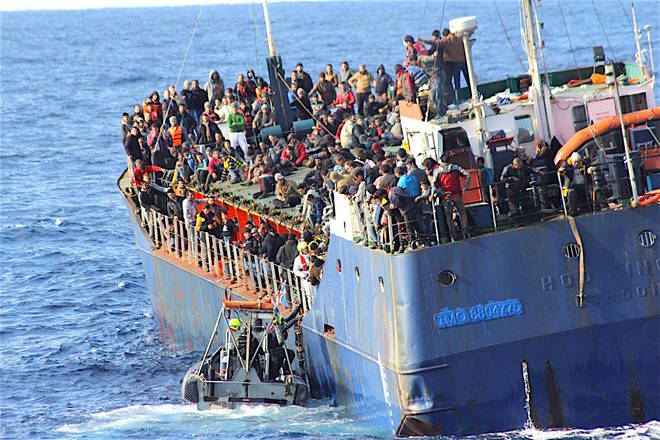Despite the COVID-19 pandemic ravaging the world, there is still a significant number of irregular migrants leaving the shores of Africa for Europe, a report by the International Organization for Migration (IOM) has indicated.
For instance, 38,931 arrivals to Europe were recorded from January 2020 till August 5 while about 500 people were either dead or missing mostly on the Mediterranean Sea.
- Sokoto herbalists ‘find cure’ for COVID-19
- Russia becomes first country to approve a COVID-19 vaccine – Putin
Out of the figure of arrival, 35, 297 arrived by sea while 3,634 arrived through the land.
This was disclosed at the ongoing virtual media workshop on migration organized by IOM.
IOM Awareness Raising Officer, Cyprine Cheptepkeny who earlier reeled out the “Flows and Trends- the Mediterranean Irregular Migratory Route” disclosed that in 2019, there were 110,669 irregular arrivals to Europe with 1,283 dead/missing.
However, the 2019 figure indicated a downward trend compared to 2018 when there were 144,166 arrivals to Europe with 2,299 dead/missing.
In 2017, there were 186,768 arrivals to Europe with 3,116 dead or missing, according to the IOM data.
From 2016, the IOM has recorded significant drop in the number of irregular migrants going to Europe owing to the activities of the United Nation Migration agency as the statistics shows four years. In 2016, 390,432 Europe arrivals were recorded while 5,143 were either dead or missing.
Daily Trust reports that since 2016, IOM under its EU Assisted Voluntary Returnees exercise has facilitated the repatriation of 20,500 Nigerians from Libya and other African countries with over 8000 reintegrated in different businesses.
Speaking further, Cheptepkeny disclosed that there are at least 663,445 migrants in Libya with 10 per cent of them being Nigerian. The migrants are of 44 nationalities with Niger Republic having the highest number of 20 per cent.
IOM Nigeria Public Information Officer, Jorge Galindo who is one of the facilitators stated that there has been decrease in the number of migrants since 2016.
But he added that despite the decrease, “migrants continue to die at the sea. The arrivals may be decreasing, the ratio of sea crossings and deaths is more or less stable or on the rise.”
Meanwhile, the IOM said the COVID-19 pandemic has impacted negatively on its migrant protection and assistance in Nigeria.
Galindo said it is taking longer than expected to provide assistance to refugees and vulnerable migrants due to the travel restrictions imposed by countries.
“It is difficult to provide assistance that is timely,” he said, adding, “The availability is much more limited.”
He however stated that despite the restrictions, the organization has been working very closely with the Presidential Taskforce on COVID-19 to provide assistance to migrants stranded in Dubai, Saudi Arabia and other countries.
IOM, Galindo reiterated, “is ready to provide assistance for anyone willing to come back home but stated that this has to be agreed upon by both countries.

 Join Daily Trust WhatsApp Community For Quick Access To News and Happenings Around You.
Join Daily Trust WhatsApp Community For Quick Access To News and Happenings Around You.


